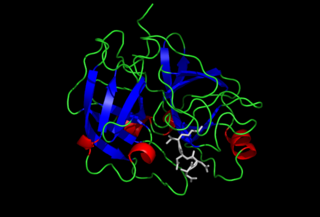
Enteropeptidase is an enzyme produced by cells of the duodenum and is involved in digestion in humans and other animals. Enteropeptidase converts trypsinogen into its active form trypsin, resulting in the subsequent activation of pancreatic digestive enzymes. Absence of enteropeptidase results in intestinal digestion impairment.

Trypsin-1, also known as cationic trypsinogen, is a protein that in humans is encoded by the PRSS1 gene. Trypsin-1 is the main isoform of trypsinogen secreted by pancreas, the others are trypsin-2, and trypsin-3 (meso-trypsinogen).

Serine protease HTRA2, mitochondrial is an enzyme that in humans is encoded by the HTRA2 gene. This protein is involved in caspase-dependent apoptosis and in Parkinson's disease.

Kallikrein-6 is a protein that in humans is encoded by the KLK6 gene. Kallikrein-6 is also referred to as neurosin, protease M, hK6, or zyme. It is a 223 amino acid sequence, derived from its 244 original form, which contains a 16 residue presignal and 5 residue activation peptide.
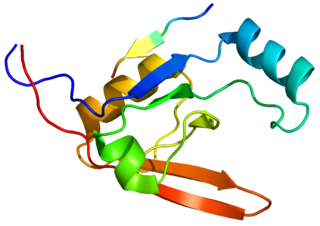
Serine protease HTRA1 is an enzyme that in humans is encoded by the HTRA1 gene. The HTRA1 protein is composed of four distinct protein domains. They are from amino-terminus to carboxyl-terminus an Insulin-like growth factor binding domain, a kazal domain, a trypsin-like peptidase domain and a PDZ domain.
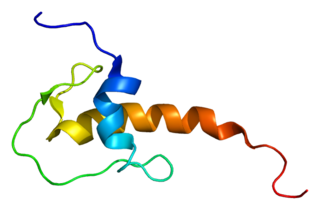
Lympho-epithelial Kazal-type-related inhibitor (LEKTI) also known as serine protease inhibitor Kazal-type 5 (SPINK5) is a protein that in humans is encoded by the SPINK5 gene.

Kallikrein-11 is a protein that in humans is encoded by the KLK11 gene.

Serine protease 23 is an enzyme that in humans is encoded by the PRSS23 gene.

Beta-1,3-N-acetylglucosaminyltransferase lunatic fringe, (Lunatic Fringe), is a protein encoded in humans by the LFNG gene.
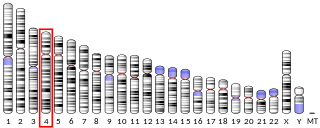
Serine protease inhibitor Kazal-type 2 also known as acrosin-trypsin inhibitor is a protein that in humans is encoded by the SPINK2 gene.

Thymus-specific serine protease is an enzyme that in humans is encoded by the PRSS16 gene.

Brain-specific serine protease 4 (BSSP-4), also known as serine protease 22 or tryptase epsilon, is an enzyme that in humans is encoded by the PRSS22 gene.

Forkhead box protein E3 (FOXE3) also known as forkhead-related transcription factor 8 (FREAC-8) is a protein that in humans is encoded by the FOXE3 gene located on the short arm of chromosome 1.

Protease, serine, 2 is a protein that in humans is encoded by the PRSS2 gene.

Protease, serine, 3 is a protein that in humans is encoded by the PRSS3 gene.
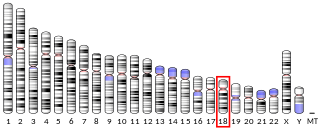
Retinal homeobox protein Rx also known as retina and anterior neural fold homeobox is a protein that in humans is encoded by the RAX gene. The RAX gene is located on chromosome 18 in humans, mice, and rats.

Leucine rich transmembrane and O-methyltransferase domain containing is a protein that in humans is encoded by the LRTOMT gene.

Homeobox protein CDX-4 is a protein that in humans is encoded by the CDX4 gene. This gene is a member of the caudal-related homeobox transcription factor family that also includes CDX1 and CDX2.

Serine protease 55 is a protein that in humans is encoded by the PRSS55 gene.
Mounira Hmani Aifa is a Tunisian geneticist, best known for her work in mapping the PRSS56 gene. She has been a recipient of the "Sur les traces de Marie Curie" award from UNESCO and the L'Oreal Foundation in 2012, and a fellowship from them in 2002.




















